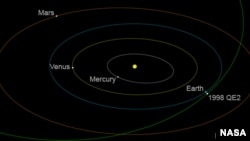A 2.7-kilometer-wide asteroid will pass within 5.8 million kilometers of Earth on Friday, May 31, and while it poses no threat to Earth, it will provide a chance to collect scientific information about minor planets.
"Asteroid 1998 QE2 will be an outstanding radar imaging target, and we expect to obtain a series of high-resolution images that could reveal a wealth of surface features," said radar astronomer Lance Benner at NASA's Jet Propulsion Laboratory in Pasadena, Calif.
"Whenever an asteroid approaches this closely, it provides an important scientific opportunity to study it in detail to understand its size, shape, rotation, surface features, and what they can tell us about its origin,” Benner said. “We will also use new radar measurements of the asteroid's distance and velocity to improve our calculation of its orbit and compute its motion farther into the future than we could otherwise."
Radar images from the Goldstone radar antenna could resolve features on the asteroid as small as 3.75 meters across, even from four million miles away.
"It is tremendously exciting to see detailed images of this asteroid for the first time," said Benner. "With radar we can transform an object from a point of light into a small world with its own unique set of characteristics. In a real sense, radar imaging of near-Earth asteroids is a fundamental form of exploring a whole class of solar system objects."
The closest approach of the asteroid occurs at 20:59 UTC on May 31. This is the closest approach the asteroid will make to Earth for at least the next two centuries. Asteroid 1998 QE2 was discovered on Aug. 19, 1998, by the Massachusetts Institute of Technology’s Lincoln Near Earth Asteroid Research (LINEAR) program near Socorro, New Mexico.
Asteroid 1998 QE2, which is the size of nine Queen Elizabeth 2 ship-lengths, is not named after that 12-decked ship. The similar name is merely a coincidence.
"Asteroid 1998 QE2 will be an outstanding radar imaging target, and we expect to obtain a series of high-resolution images that could reveal a wealth of surface features," said radar astronomer Lance Benner at NASA's Jet Propulsion Laboratory in Pasadena, Calif.
"Whenever an asteroid approaches this closely, it provides an important scientific opportunity to study it in detail to understand its size, shape, rotation, surface features, and what they can tell us about its origin,” Benner said. “We will also use new radar measurements of the asteroid's distance and velocity to improve our calculation of its orbit and compute its motion farther into the future than we could otherwise."
Radar images from the Goldstone radar antenna could resolve features on the asteroid as small as 3.75 meters across, even from four million miles away.
"It is tremendously exciting to see detailed images of this asteroid for the first time," said Benner. "With radar we can transform an object from a point of light into a small world with its own unique set of characteristics. In a real sense, radar imaging of near-Earth asteroids is a fundamental form of exploring a whole class of solar system objects."
The closest approach of the asteroid occurs at 20:59 UTC on May 31. This is the closest approach the asteroid will make to Earth for at least the next two centuries. Asteroid 1998 QE2 was discovered on Aug. 19, 1998, by the Massachusetts Institute of Technology’s Lincoln Near Earth Asteroid Research (LINEAR) program near Socorro, New Mexico.
Asteroid 1998 QE2, which is the size of nine Queen Elizabeth 2 ship-lengths, is not named after that 12-decked ship. The similar name is merely a coincidence.





